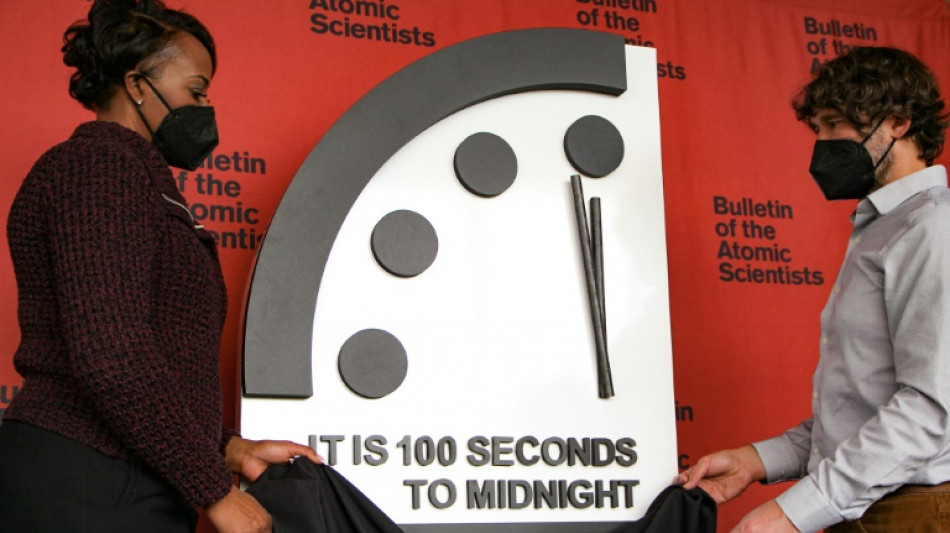
-
 Czech qualifier Bejlek claims first title in Abu Dhabi
Czech qualifier Bejlek claims first title in Abu Dhabi
-
French duo reach Shanghai, completing year-and-a-half walk

-
 Australian snowboarder James eyes elusive Olympic gold
Australian snowboarder James eyes elusive Olympic gold
-
Sequins and snow: Eva Adamczykova makes Olympic return

-
 Vonn set for Olympic medal bid after successful downhill training
Vonn set for Olympic medal bid after successful downhill training
-
Shepherd takes hat-trick as West Indies beat Scotland in T20 World Cup

-
 Sausages will sell after thrill-seeker Von Allmen wins Olympic downhill
Sausages will sell after thrill-seeker Von Allmen wins Olympic downhill
-
Swiss racer Von Allmen wins first gold of Winter Olympics

-
 'Wake up': Mum sparks comeback after scare for freeski star Gu
'Wake up': Mum sparks comeback after scare for freeski star Gu
-
Von Allmen wins men's Olympic downhill gold, first of Games

-
 First medals up for grabs at Winter Olympics
First medals up for grabs at Winter Olympics
-
Afghanistan captain Khan harbours dream of playing in Kabul

-
 Lindsey Vonn completes second Winter Olympics downhill training run
Lindsey Vonn completes second Winter Olympics downhill training run
-
Freeski star Gu survives major scare in Olympic slopestyle

-
 Iran FM looks to more nuclear talks, but warns US
Iran FM looks to more nuclear talks, but warns US
-
Hetmyer's six-hitting steers West Indies to 182-5 against Scotland

-
 After boos for Vance, IOC says it hopes for 'fair play'
After boos for Vance, IOC says it hopes for 'fair play'
-
Thousands gather as Pakistan buries victims of mosque suicide attack

-
 Lindsey Vonn completes second downhill training session
Lindsey Vonn completes second downhill training session
-
US pressing Ukraine and Russia to end war by June, Zelensky says

-
 Faheem blitz sees Pakistan avoid Netherlands shock at T20 World Cup
Faheem blitz sees Pakistan avoid Netherlands shock at T20 World Cup
-
Takaichi talks tough on immigration on eve of vote

-
 England's Salt passed fit for T20 World Cup opener
England's Salt passed fit for T20 World Cup opener
-
Spain, Portugal brace for fresh storm after flood deaths

-
 Pakistan bowl out Netherlands for 147 in T20 World Cup opener
Pakistan bowl out Netherlands for 147 in T20 World Cup opener
-
Pushed to margins, women vanish from Bangladesh's political arena

-
 Crypto firm accidentally sends $40 bn in bitcoin to users
Crypto firm accidentally sends $40 bn in bitcoin to users
-
Pistons end Knicks' NBA winning streak, Celtics edge Heat

-
 Funerals for victims of suicide blast at Islamabad mosque that killed at least 31
Funerals for victims of suicide blast at Islamabad mosque that killed at least 31
-
A tale of two villages: Cambodians lament Thailand's border gains

-
 Police identify suspect in disappearance of Australian boy
Police identify suspect in disappearance of Australian boy
-
Cuba adopts urgent measures to address energy crisis: minister

-
 Not-so-American football: the Super Bowl's overseas stars
Not-so-American football: the Super Bowl's overseas stars
-
Trump says US talks with Iran 'very good,' more negotiations expected

-
 Trump administration re-approves twice-banned pesticide
Trump administration re-approves twice-banned pesticide
-
Hisatsune leads Matsuyama at Phoenix Open as Scheffler makes cut

-
 Beyond the QBs: 5 Super Bowl players to watch
Beyond the QBs: 5 Super Bowl players to watch
-
Grass v artificial turf: Super Bowl players speak out

-
 Police warn Sydney protesters ahead of Israeli president's visit
Police warn Sydney protesters ahead of Israeli president's visit
-
Simi Khanna Launches Simi Beauty SK: A Natural Skincare Line Blending Luxury, Wellness, and Purpose

-
 Best Gold IRA Companies February 2026 Announced (Top Gold-backed IRA Companies Revealed)
Best Gold IRA Companies February 2026 Announced (Top Gold-backed IRA Companies Revealed)
-
Bolivia wants closer US ties, without alienating China: minister

-
 Ex-MLB outfielder Puig guilty in federal sports betting case
Ex-MLB outfielder Puig guilty in federal sports betting case
-
Milan-Cortina Winter Olympics open with dazzling ceremony

-
 China overturns death sentence for Canadian in drug case
China overturns death sentence for Canadian in drug case
-
Trump reinstates commercial fishing in protected Atlantic waters

-
 Man Utd can't rush manager choice: Carrick
Man Utd can't rush manager choice: Carrick
-
Leeds boost survival bid with win over relegation rivals Forest

-
 Stars, Clydesdales and an AI beef jostle for Super Bowl ad glory
Stars, Clydesdales and an AI beef jostle for Super Bowl ad glory
-
Dow surges above 50,000 for first time as US stocks regain mojo


Glimmers of hope, but Doomsday Clock stuck at 100 seconds to midnight
The "Doomsday Clock," representing the judgment of leading science and security experts about perils to human existence, remains at 100 seconds to midnight this year, with advances like Covid-19 vaccines balanced by rising misinformation and other threats.
Bulletin of the Atomic Scientists president Rachel Bronson declared Thursday the world was no safer this year than two years ago, when the clock's hands were moved to their current position.
"If humanity is to avoid an existential catastrophe, one that would dwarf anything it has yet seen, national leaders must do a far better job of countering disinformation, heeding science and cooperating," she told reporters on the 75th anniversary of the clock's initial unveiling.
The fact that it hasn't shifted closer to midnight does not imply threats have stabilized, the group said in a full statement.
"On the contrary, the Clock remains the closest it has ever been to civilization-ending apocalypse because the world remains stuck in an extremely dangerous moment."
The Bulletin was founded in 1945 by Albert Einstein, J Robert Oppenheimer and other scientists who worked on the Manhattan Project which produced the first nuclear weapons.
The idea of the clock symbolizing global vulnerability to catastrophe followed in 1947.
Its time is set by the organization's board, with the support of its board of sponsors, which includes 11 Nobel laureates.
In its statement, the Bulletin noted hopeful developments at the start of 2021, including the renewal of the New START arms control agreement between the United States and Russia.
But international tensions continue to loom ominously, including most recently over Ukraine. The United States, Russia and China meanwhile continue their march to develop hypersonic weapons.
- Nice words, but little climate action -
No country meanwhile remains immune to threats to democracy, the Bulletin said, "as the January 6, 2021 insurrection at the US Capitol demonstrated."
More than 10 percent of those charged with crimes related to the riot were active or retired service members, underscoring extremism in the military.
On climate, COP26 in Glasgow offered positive rhetoric but relatively little action.
Encouragingly, several countries announced net-zero carbon dioxide targets by 2050, but getting there would require immediate divestment from fossil fuels, investment in renewables, upgrading infrastructure and shifting land use and agriculture practices.
"The past year has seen a staggering onslaught of climate disasters," said Raymond Pierrehumber, a professor of physics at the University of Oxford.
"We've had the heat dome over North America, worldwide fires, drought, floods, but this is just a sample of what is to come if we don't get the emissions of carbon dioxide to zero."
And while Covid-19 has focused the world's scientific attention, governments must be prepared for other biological threats -- from weapons programs to the rise in antibiotic resistance, which the Bulletin said could trigger a new pandemic within a decade.
The Bulletin particularly highlighted how disinformation -- much of it stoked by politicians in high office -- is undermining faith in science and handicapping the world's ability to confront its challenges.
"A particularly invidious threat is the intentional undermining of the public's ability to sort out what's true from what's patently false by information warfare," said Sharon Squassoni, co-chair of the board and a research professor at George Washington University.
"This subverts our ability to arrive at consensus on the solutions needed to achieve positive change," she added.
The Bulletin called on Washington and Moscow to expand the scope of nuclear reduction, and for the world's leading polluters to accelerate decarbonization.
"China should set an example by pursuing sustainable development pathways -- not fossil fuel-intensive projects" in its global infrastructure initiative known as Belt and Road, it said.
The United States and other leading countries should meanwhile heighten cooperation through the World Health Organization to reduce biological risks.
This would involve improving monitoring of animal-human interactions, increasing international disease surveillance, and ramping up production and distribution of medical supplies.
M.A.Colin--AMWN


